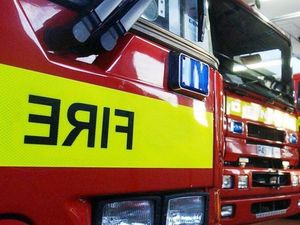Hundreds of attacks on firefighters - including assaults, objects thrown and harassment
Firefighters in the West Midlands have been attacked or verbally abused more than 1,000 times in just over a decade, figures show.

At least 8,600 attacks have been recorded by fire brigades across England since 2010-11 – and more than 500 firefighters have been injured as a result.
Home Office statistics show crews from the West Midlands Fire Service were at the centre of 1,057 of those incidents, with 116 attacks recorded by the fire service in the year to March.
In light of the figures, police chiefs vowed to use the full force of the law against those who subject emergency workers to "deplorable" attacks.
Since recording began just over a decade ago, 31 West Midlands firefighters have been physically injured in attacks, with four of those requiring a hospital stay due to serious injuries.
During that time, crews were subject to 43 incidents of physical abuse, had objects thrown at them on 150 occasions, had verbal abuse directed at them 691 times, experienced 67 episodes of harassment and dealt with at least 106 other aggressive incidents.
Despite firefighters attending fewer incidents and fires during the first year of the coronavirus pandemic, attacks increased nationally, with 934 recorded across England in 2020-21 compared to 899 the year before.
And the true figures could be higher, as those reported only reflect assaults experienced during operational incidents and do not take into consideration abuse that has taken place at or around fire stations or as crews are carrying out fire prevention work, for example.
A spokesperson for West Midlands Fire Service said: “Any emergency service worker being attacked as they go about their work is clearly wrong and won’t be tolerated.
“It is a serious issue, but we are fortunate as a service that incidents are fairly low in number when you consider the thousands of incidents we attend each year.
“However, we and our Fire Authority will work closely with the police to bring culprits to justice. In serious cases you can go to jail.
“Whilst most of the incidents we record are verbal, this can still be intimidating for our crews who are simply trying to do their job and safely resolve an emergency.
“But we’ve also recorded instances of objects being thrown, threatening behaviour and even cases where weapons have been present.
“We have a reporting system so our staff can let us know of instances, meaning we can identify hot spots and enabling local Station Commanders to work with their local contacts to try to resolve things.
“We can also use our data to highlight ‘problem’ locations to our crews before they arrive and, if absolutely necessary, call for urgent assistance from the police.
“We run awareness sessions for our trainee firefighters and an online course for all of our staff on managing difficult situations.
“We will support our staff in every way we can if ever they’re unfortunate enough to be attacked and a case goes to court. And we have a wide range of other support we can provide, including counselling and the services of our Occupational Health team.”
Over in Staffordshire, firefighters have been attacked or verbally abused 177 times in just over 10 years, with 16 attacks recorded by the fire service in the year to March.
Matt Wrack, general secretary of the Fire Brigades Union, said: "Any attack on firefighters – who are providing a humanitarian service – is something to be deplored.
"It is paramount that fire and rescue services provide appropriate support to firefighters who are subject to such attacks, including taking into account any mental health effects of these incidents, and being understanding when it comes to sick leave.”
Verbal abuse is the most common type of attack recorded nationally, accounting for 57% of incidents recorded by fire services since 2010-11.
Around a quarter of incidents involved objects being thrown at firefighters, while 5% were physical attacks.
A spokesman for the National Police Chiefs' Council said it is never acceptable for anyone to be assaulted or harmed for doing their job.
He added: “Last year, the maximum jail term for attacking emergency workers was doubled.
"This sent a clear message that society will not tolerate abuse of our emergency workers.
"We will use the full force of the law to prosecute anyone who uses violence against those who are on the front line.”





